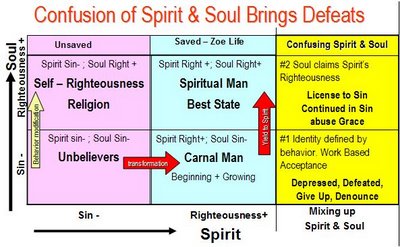We have shared that man is a tripartite being of spirit, soul, and body. When a person is saved, his spirit is reborn by the Holy Spirit and has the indwelling of the Holy Spirit. But his soul and body remain unchanged. This explains the need of Rom 12:2 when one mind has to be renewed with the Word of God. And also for 1 Cor 5:5 where the flesh is destroyed and the spirit is saved. Our rebirth spirit is of God, ZOE life, and is perfect in righteousness and complete (Col 2:10, 2Pet 1:3 given all, Eph 3:20 power in us) and sin not (1 John 3:9). But our flesh does sin (Rom 7).
With Spirit and Soul against Righteousness and Sin, we have 4 combinations. With the confusion of spirit and soul, we can add 2 more. See the picture below. The point of interest is in the confusion of Spirit (righteousness) and Soul (need to be sanctified).
The point of interest is in the confusion of Spirit (righteousness) and Soul (need to be sanctified).
Confusion Type 1 Acceptance by Work
With Spirit and Soul against Righteousness and Sin, we have 4 combinations. With the confusion of spirit and soul, we can add 2 more. See the picture below.
 The point of interest is in the confusion of Spirit (righteousness) and Soul (need to be sanctified).
The point of interest is in the confusion of Spirit (righteousness) and Soul (need to be sanctified).Confusion Type 1 Acceptance by Work
- The person's Identity is defined by the behavior of the Soul instead of by the Bible
- It is "Performance or Work Based Acceptance by God".
- A person's identity should be defined by his spirit – Rebirth ZOE (God’s kind of ) Life, that is complete and righteous. Have the Indwelling Holy Spirit and Christ inside and not by his performance of the Soul and body.
- These people will feel good when they have quiet time, and prayers but will feel terrible when they sin. They felt condemned. However, instead of drawing from God, they promise to do better. But by their own strength, they will fail again, which results in condemnation.
- Some will try to remove condemnation by doing good work to compensate. They actively serve in church to remove the condemnation inside. They ask God for forgiveness and strength not realizing that Grace has been given in their Spirit and did not draw from it.
- Long-term defeat and burnout result in them coming to the conclusion that God is not real or not helpful or not loving and hence they give up on God and go back to the world.
- Sin ->Defeat ->Depressed ->Give Up -> Back to the World-> Denounce Christ
- These people claim Spiritual Righteous Standing before God for their Souls as well.
- They believe that no matter what they do with their flesh (soul and body) they will always be righteous.
- Salvation Grace becomes a License to Sin.
- When they sin, they must confess their righteousness in Christ (sin-focused brings bondage, righteousness-focused brings freedom)
- Sinful acts are pardoned with God’s grace.
- Their salvation is of doubt as they misuse God’s grace.
Feeding the passage to ChatGPT gives the following response which I think is excellent. So included here:
No comments:
Post a Comment